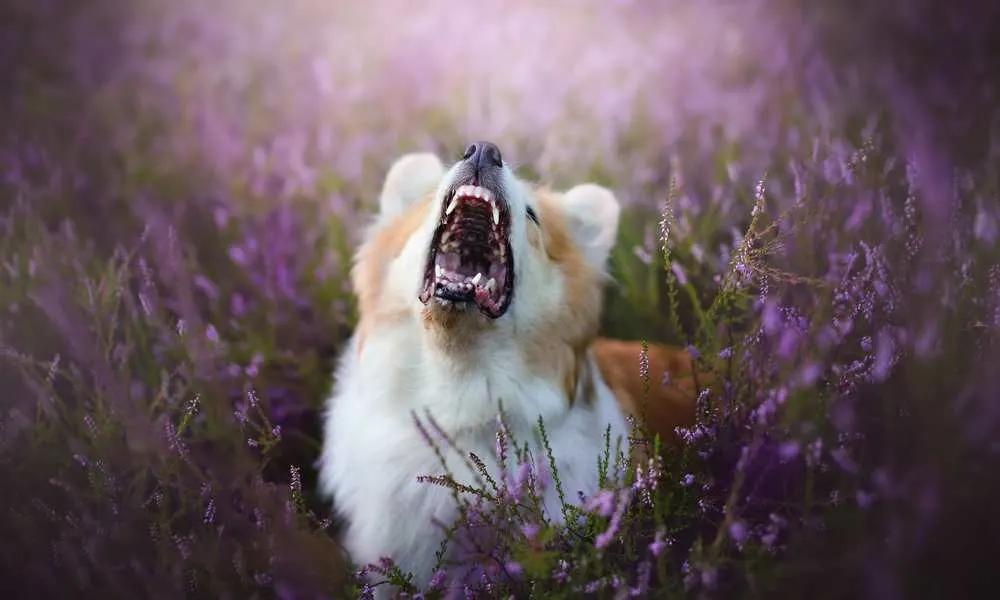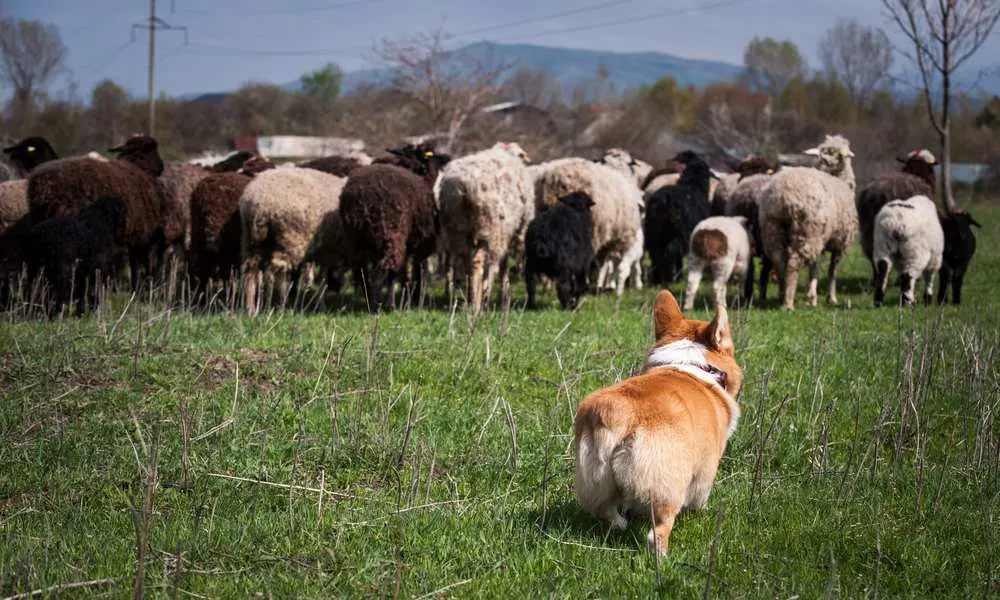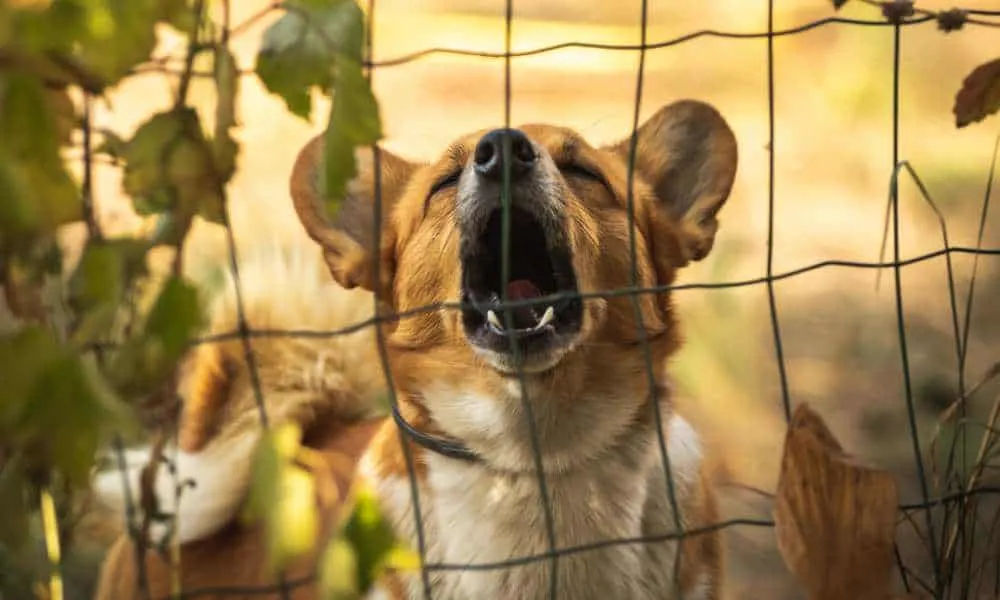When you get a new puppy, it brings excitement for the entire family. The kids are especially excited when a puppy enters the household since they get a new playmate.
However fun, getting a new family member can be stressful, as well. The puppy needs to be trained as soon as they arrive, and that’s not always easy with Corgis.
If this is your first pup, training a Corgi can result in some aggressive acts. The best way to make sure that you nip this behavior in the bud is obedience training.
So, how to stop aggression in Corgis? How can you teach your Corgi to be obedient? Read our article to find out more!

How To Stop Aggression In Corgis?
The key to getting an obedient Corgi for yourself is correcting lousy behavior as soon as it occurs. If you do not, the Corgi will almost feel like you’re encouraging them to misbehave.
Aggression is not only unwanted and annoying – it can be dangerous. If your pet learns to play rough house, he can damage your property or even hurt a family member.
To avoid all that, you should stick to obedience training as long as you need to. There are a few methods that can help eradicate aggressive behavior from your Corgi as it occurs.
When it comes to treating Corgi’s aggression – it’s always better to do it sooner rather than later. If you wait too long to do it, removing unwanted behavior could be next to impossible.
So, to make sure your Corgi is acting right, you should take some time to treat the mischief immediately. Do note that training a Corgi can be difficult, so get your patience in order before you start.

Noticing The Aggressive Behavior
Some may believe that your dog starts behaving aggressively out of the blue – but that’s not true. You can see the changes in the behavior minutes before your dog starts growling or biting. Growling and biting are just the final moments of aggression.
Some displays of aggression are to be noticed beforehand like turning away, yawning, and a stiffened body. These displays may seem like your dog isn’t aggressive but lonely or just tired, but that’s not it – it’s a sure sign that your dog is becoming upset.
What’s more, you should keep in mind that your dog usually doesn’t react aggressively because he is angry with you. Aggressive acts mostly come from a place of fear – meaning, there is something that upsets your puppy in his surroundings. You should try to figure out that thing by remembering what happened before the outburst.
One more thing: between the two breeds of the Welsh Corgi – the Cardigan and the Pembroke, there are differences in the anger outbursts. The Pembroke is more likely to express anger and aggressive behavior – so keep this in mind when you’re deciding between these two breeds.

Managing Aggressive Behavior
To manage aggressive behavior, you will need to find the source of that fear and treat it accordingly. Getting rid of your Corgi’s barking or biting won’t make your pet feel better about a certain situation – he will just stop reacting the way he used to.
So, punishing or disciplining your Corgi for barking will not help your pet feel any better about the thing that’s upsetting them. On the other hand, it could result in your pet feeling worse. The reason behind that is that the barking is the last thing your pup will do before he attempts to bite.
Consequently, your dog will stop barking because he’s disciplined for doing so – but that worsens the overall situation. When you only teach your dog to stop barking, you only eradicate the reaction and not the overall situation. This all will result in your dog going straight to biting, without the barking.
This is the road you shouldn’t take by any account – you should work on the situation that makes your dog feel unsafe. If your dog goes straight to biting when they’re feeling unsafe, the Corgi will likely need management for the rest of their life.
Keep in mind that the growling or barking is simply a reaction to the situation the Corgi is in. That’s why you should not punish the Corgi puppy for growling.
When your pup barks, it’s a sign that something is upsetting them – and they are trying to communicate on it. If you don’t allow the pup to communicate, they will bite not out of spite, but because there is no other way to say it.
The Corgi acting aggressive means you should try to remove them from the situation that makes them upset. Listen to your dog – they are trying to tell you what’s wrong.

Possible Triggers For Corgi’s Aggression
If you are the reason why the puppy is upset, remove yourself from the situation to help the dog calm down. At all times, you should try to keep everyone safe, and the Corgi happy – more or less.
After everything is over, try to remember if you did something that could have upset your puppy. Perhaps you – or someone else, did something out of the ordinary and made the Corgi aggressive in the process.
Professional dog trainers refer to these acts as triggers – as some situations can trigger your Corgi’s aggressive behavior. The triggers should be worked on to eradicate aggressive behavior.
Treating triggers to help the dog feel better about them helps the dog feel safer. You should break down the trigger into something less scary. Then, work further on the issue – and your Corgi will feel differently about the trigger in no time.
Also, a common trigger among the dogs, even Corgis, is the one associated with the leashes. Getting used to the leash is difficult for some puppies.
It’s common that your dog displays more aggressive behavior on the leash rather than not. The Corgi can feel trapped with the leash because they might feel the need to flee if they spot something potentially dangerous.
Also, the leash can frustrate your Corgi because they don’t feel free – and the leash might stop them from seeing whatever they like. When your Corgi gets frustrated by this and he’s still in training, all this may result in some aggression.
The situation that triggers your puppy the most is meeting another dog on a leash. Because of the restraint, the dogs aren’t able to greet each other – which can result in barking, and even biting the owner.
Surely, it will be best to teach your puppy that the play-time with other dogs is only off-leash – by keeping them away from dogs on their first outings. Teach them that they should explore around when they are on the leash, but reserve the playing for other times.
Keep them far away from dogs when on the leash and discourage making contact with them. If you do it with success, the aggression will be gone and your pet and you will be able to take more relaxing walks together.

Methods For Aggression Management
For the best aggression and anger management for your Corgi, you should try to avoid the situations that trigger your pup. To avoid those triggers, you should work to change up the routine of your family to remove the triggers.
One of the best things you can do is to install a baby gate or add another doorway. This extra barrier can be very important when your puppy has an aggression episode.
Another thing that could work is muzzle training – which can work for dogs dealing with aggressive episodes. When your Corgi is still a puppy, teaching him to feel comfortable wearing a muzzle can make you and your children feel safer.
If you do choose to go with a muzzle, take your time to pick out a proper muzzle that fits your dog. A good-fitting muzzle will still allow your Corgi to drink water and take treats – without the ability to bite anyone.
Learn More: Are Corgis Food Aggressive? Stop It In Time!
Management of aggressive behavior ensures the safety of all family members – but it helps in reducing the overall aggression of the puppy. If the Corgi puppy does get upset and aggressive in a certain situation – if it happens often, it will be hard to eradicate the trigger.
Finally, if you continue to have the same problems and your puppy is still getting upset all the same, you should consider hiring a professional. A professional trainer is experienced and it will be much easier for them to train your pup to be less aggressive.
In reality, we highly recommend that you do hire a professional nonetheless. If you are worried about your safety or the safety of your family members it would be best to leave it to a pro to get rid of your Corgi’s triggers.
The pro will likely use desensitization therapy or expose the puppy to the triggers to make them get used to it. This therapy is highly successful among Corgis, and will likely help with your Corgi, too.

Background Of The Corgi’s Aggression
Do note that finding a good trainer can be difficult, too – because training Corgis is a little specific. Because of that, if trainers don’t have experience with the Corgis specifically, they could have problems with training l, too.
The reason why the Corgis are so specific is that they used to be working dogs. Corgis were working with cattle – herding the cattle and keeping them safe from predators.
The Corgis were so-called “heelers” – dogs that nip at the heels of the much larger cattle to get them to move. That’s also one of the reasons why Corgis can bite – they can get upset if the family is scattered across the house.
So, their instinct is calling for them to herd their family members. Corgis’ nature intended for them to be independent and to have lots of responsibility.
Their instincts are sometimes calling to them, but mostly they can be treated with obedience training. Do keep in mind that your Corgi will sometimes act like he has a mind of his own nevertheless – and if he isn’t dangerous, you should just let him be.
The Corgi was once a dog that had to take care of a large number of animals – the Corgi had to keep them together. What’s more – the Corgi kept the animals safe from predators.
The Corgi may seem small – but don’t let the size fool you. The Corgi was responsible for keeping the cattle safe from potential predators – since they are rather fast and they respond in a matter of moments.

Why Does My Corgi Bark?
Corgis can bark for several reasons, to be honest. Most often, you will find your Corgi barking when he feels that there is danger nearby.
Corgis have a keen sense of hearing, and they can hear sounds humans cannot. If the Corgi feels that they heard something unusual – a potential threat, their usual response is barking.
Barking is one of the most annoying things your Corgi can do – and you should try your best to keep them quiet. It will not only be annoying for you – but your neighbors as well.
For a smaller dog, the Corgi’s bark is rather loud, because their nature needed them to be loud enough to alert people about a potential danger. You should never encourage your puppy to bark because you will never be able to get rid of this behavior later on.
Keep in mind that the barking can only be kept at a minimum – but it cannot be removed completely. Sometimes, your Corgi will have to bark, and that’s okay.
Only if you feel that your puppy is barking too loud at every single sound they hear should you consult a professional. They might be able to do some desensitization therapy to make your pup respond less to sounds.
Bottom Line
To conclude, there are a few things you can do to stop the aggression in your Corgi. The most important thing is to consider hiring a professional.
The professional might be able to eradicate unwanted behavior faster and with more success. If you have experience with puppy training, you can try to tackle the subject on your own.
However, keep in mind that your Corgi will still bark at times – and there is truly nothing you can do about it. Sometimes, you just have to let your Corgi be a Corgi!

